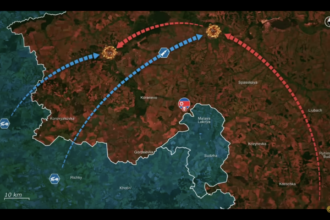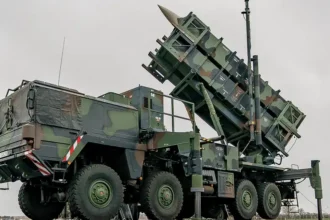The re-election Donald Trump as president of the United States is a topic of discussion in Europe. With dozens of world leaders meeting in Budapest to discuss the issue, it’s the perfect opportunity to have a serious discussion.
Trump’s first term as president saw a dramatic deterioration of relations. He was angry that European countries did not pay more for their own security.
He was furious about the US trade deficit. He was particularly angry with EU superpower Germany on both counts. Just ask German ex-Chancellor Angela Merkel.
What will the future Trump Presidency mean for Africa? What about Ukraine, in particular?
Volodymyr Zelensky, the Ukrainian ambassador to Hungary, is in Budapest for a meeting with the European Political Community. The idea was conceived by French President Emmanuel Macron – launched after Russia’s full scale invasion of Ukraine, as a talk-shop to tackle common continental challenges.
The fear is that the new US Administration will slow down, if it doesn’t stop, the flow American military aid to Kyiv. The US is the largest single donor for Ukraine. By far. And Europe will struggle with picking up the slack.
Donald Trump has boasted that he can end the war against Russia in one day. What’s not clear is whether Trump wants Ukraine to win.
The leaders of Europe, including UK Prime Minister Sir Keir starmer, Macron, and German Chancellor Olaf Scholz have repeatedly vowed to stand by Ukraine.
Zelensky will urge them to keep their word on Thursday.
Kyiv is facing a difficult time, to put it mildly.
Germany, Ukraine’s second-largest donor, is also a concern. The three-party coalition that governed Ukraine fell on Wednesday evening.
Viktor Orban, Hungary’s Trump-loving Prime Minister, is the host for Thursday’s event. Orban is also well-known for having close ties with Moscow, and his unwillingness to impose sanctions against Russia or provide self-defence arms to Ukraine.
He has repeatedly called for the EU to demand a “unconditional, immediate ceasefire” between Ukraine & Russia, going against the insistence of Ukraine’s western allies that Kyiv should dictate terms.
Orban says that Donald Trump is in his “pro-peace camp”.
All this said, President Zelensky in Budapest on Thursday hopes to maintain friendly relations as long as possible with the new Trump Administration.
This was made abundantly clear by the overwhelmingly gushy congratulatory messages sent on social media by European leaders. Trump will be aware that the majority of them favored his Democratic rival for the presidential election, Kamalah Harris.
The US election race was always expected to be close, and EU officials say they are better prepared than they were in 2016, when they got caught by surprise.
But Donald Trump’s isolationism is still a cause for concern in Europe.
The continent looks up to the US as a source of security. Since the end of World War Two, it has looked to the US for security. It wants to protect Ukraine from Russian expansionism, and it wants help defending Ukraine. The problem is that Trump is not a fan of Nato (and this is putting it nicely) the transatlantic military alliance.
Trade is a concern for all, but especially the EU.
The US is the largest trade partner. Donald Trump, however, is a protectionist. He says he loves to slap tariffs on imports.
This is bad for Europe’s already slow economies. Export-dependent Germany with its ailing automotive industry. The European Commission is ready to take retaliatory actions if necessary, but prefers not to engage in a trade war with Trump.
Unity is another issue. Trump, with his America First Policy, like Vladimir Putin of Russia or Xi Jinping from China, who both push their nationalist agendas in the world, would rather not face off against a united, strong Europe. Their preference is to divide and rule.
Viktor Orban’s not the only Trump fan in this room. The prime ministers of Slovakia and Italy are also big Trump fans. They are more Donald Trump-friendly than most others.
Brussels is worried about the other EU members who may be rushing to establish good bilateral relations with Donald Trump, at the expense or unity. The bloc will be weaker.
A diplomat from the EU I spoke with, who asked to remain anonymous in order to speak openly, believes that the opposite is also true.
He told me that “we in Brussels were angsty about Brexit at the moment.”
“We thought that other member states would follow Britain out of the EU.” The reverse was true. The Brexit process brought the EU countries closer together. Donald Trump could have the same effect. Drive us closer together. “Force us to be more independent.”
Before the US presidential election, Donald Tusk, the Polish Prime Minister and a former prominent figure in Brussels, declared on X that “the future of Europe does not depend on presidential elections in America, but primarily depends on Europe itself.”
Maybe. Or maybe not.
Another school of thought, which is a bit more fearful among traditional politicians in Europe, is that Donald Trump’s victory could be a boost to right-wing nationalists closer to home.
European populists who believe that they are the real voice of voters, and are upset about the economy, immigration, the state of their respective country, and demand change now.
Read More @ www.bbc.com




